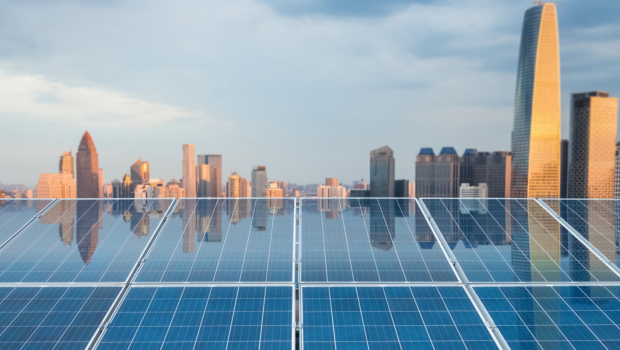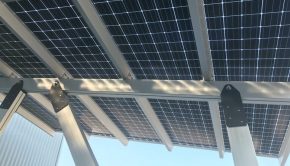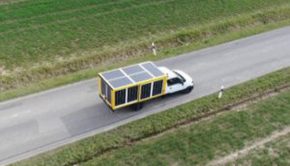Solar plus storage company seeks to disrupt the status quo — Episode 105 of Local Energy Rules Podcast
Solar plus storage company seeks to disrupt the status quo — Episode 105 of Local Energy Rules Podcast

The global pandemic has put a pause to all kinds of commerce. As wildfire season nears and climate change worsens, are solar and storage companies still preparing communities for the disasters ahead?
In this episode of the Local Energy Rules podcast, host John Farrell speaks with Anne Hoskins, Chief Policy Officer at Sunrun. They discuss the benefits of distributed energy storage, how the world’s leading solar-plus-storage company is faring in a pandemic, and how effective utility regulation can allow for transformative energy policy.
Listen to the full episode and explore more resources below — including a transcript and summary of the conversation.
Podcast (localenergyrules): Play in new window | Download | Embed
Subscribe: Apple Podcasts | Android | Stitcher | RSSEpisode Transcript
Sunrun, the #1 residential solar panel company
A research group has named Sunrun “the world’s leading solar-plus-storage vendor,” since the company is expected to install 40 gigawatts of capacity in the next decade. Chief Policy Officer Hoskins has been with Sunrun in San Francisco since 2016.
Hoskins’s career has spanned many regulatory spheres. She has worked in telecom policy with Verizon, studied distributed energy at Princeton, and served on the Maryland Public Service Commission. From her experiences working all angles of the regulatory process, she has one main takeaway:
There wasn’t a level playing field for participants in the regulatory process, particularly for new entrants.
Hoskins left the Maryland commission with a desire to advance clean energy and develop a more competitive, distributed energy system. These experiences and values brought her to Sunrun.
Betting big on batteries
In her time at Sunrun, Hoskins has observed the transformative power of battery storage. She describes the many benefits of backing up solar with batteries:
- Pairing batteries with solar generation provides backup power in the case of an outage.
- For utilities implementing time-of-use rates, customers can use energy storage to save money by storing energy; to use themselves when energy from the grid is most expensive, or to sell back when the energy is most valuable.
- If the utility does not price distributed energy adequately, customers can store the energy to use themselves, rather than selling it back at all.
Hoskins explains that these scenarios are most common in places facing climate impacts, like California, Hawaii, and Puerto Rico, or in states with the best rate structure incentives, like Massachusetts.
For these reasons, the energy industry is embracing storage — with Sunrun leading the way. Sunrun now offers a program where customers only pay one dollar per month for the first six months of their solar-plus-storage system.
Selling solar during a global pandemic
San Francisco, home of Sunrun headquarters, was the first U.S. city to issue a “shelter in place” order last March. Since San Francisco was ahead of the curve in regard to its Covid-19 response, explains Hoskins, Sunrun has been proactive in making necessary changes to its business practice.
For now, Sunrun has moved all of its sales online. Instead of going into homes, the company is asking potential customers to take photos and engage with contractors virtually. To some extent, says Hoskins, this has increased Sunrun’s access to customers. Many people interested in solar energy have more time to engage from home. However, this business plan excludes those without internet access and those who have never thought solar was an option.
Hoskins is especially concerned about the upcoming wildfire season. As more people realize the importance of back-up power during grid outages, Sunrun wants to provide the alternative. However, installing a solar + storage system requires more planning than buying a diesel generator. If the solar companies cannot get ahead of this, more people will be dependent upon fossil fuels.
You have to step back again and ask: what is the cause of these outages that we’re having? And [for] the climate challenges, spewing fossil fuel into the air is not helpful
Advancing proactive energy policy in a reactive regulatory system
Hoskins has worked for a regulated monopoly, served as a utility regulator, and advocated for customer-centric energy policy. She describes utility regulators as “quasi-judicial,” a trait that is not enabling for creative ideas or new alternatives. Describing the regulatory process as reactive rather than proactive, Hoskins says there needs to be a different kind of policy engagement outside of these rooms.
From her current position at a national solar company, Hoskins says it is hard for energy efficiency groups to fight the status quo in every single state proceeding. Regulators are under a lot of pressure to ensure reliability, but she stresses the need to find a way to advance the energy industry.
We really are getting to the point where it’s cost effective to do it differently… but it’s going to take planning, it’s going to take collaboration between the utilities, and it’s going to take an effort to make sure that regulators can have the bandwidth, the staffing, to be able to do both at the same time: maintain safety of the system, but also look to the future for how we can have a less expensive and more resilient system.
Despite inefficiencies, regulatory power belongs with the states
Farrell and Hoskins discuss a petition by the New England Ratepayers Association to move the issue of net metering to federal energy regulators. Some call the petitioning organization a “dark money” group, since it has not disclosed its membership. If successful, the petition would essentially end net metering in states that currently enable it.
Hoskins calls the New England Ratepayers Association misleading. They do not represent ratepayers, she argues, and are using this petition to add on to the many challenges state commissions already face. Farrell seconds these arguments and points out that the petition may be an example of disaster capitalism.
Hoskins is optimistic that the petition will not be successful. The Federal Energy Regulatory Commission is not positioned to address local situations and granting the position would go against the established history of state-based authority.
We’ve known for over two decades that this issue really belongs with the states.
Distributed solar is a win-win
When Farrell asks if there are any win-win policies for utilities and customers, Hoskins reiterates the value of rooftop solar with storage. Utilities are supposed to be serving the public, she says. They see the status quo as working just fine, but that is starting to fall apart.
It’s not unusual that incumbents who have been granted a monopoly would be resistant, but, at the same time, I think that they are, at the heart of it, trying to serve their customers as well.
Sunrun does not want customers to separate from the grid altogether. Hoskins and Sunrun do not want to be in opposition to the utility. Instead, she hopes utilities can think of solar as another resource. Because of the many benefits she stated earlier, solar could be the economic choice for utilities — rather than building a gas plant that will be a stranded asset in a decade.
Solar installers are willing to work with the utility. If the two coordinate, they can save the utility from doing costly upgrades, while providing more dependable power for communities.
What can we do together to improve the grid and improve the energy system?
Hoskins adds that the world will never run on exclusively distributed energy. There is a place for top-down utility planning, but utilities must still become more flexible and embrace new solutions.
Steps that will move the energy industry forward
Farrell asks Hoskins, what’s front of mind in the energy industry transition?
- Access. Regulators must recognize that people care about energy issues. The regulatory process must adapt to enable the new voices of a more informed public, while still taking in the best technical expertise.
- Batteries. To provide energy storage access to more people, there needs to be a big push by advocates. The information is there, but advocates need to share it.
Episode notes
See these resources for more behind the story:
For concrete examples of how cities can take action toward gaining more control over their clean energy future, explore ILSR’s Community Power Toolkit.
Explore local and state policies and programs that help advance clean energy goals across the country, using ILSR’s interactive Community Power Map.
This is episode 105 of Local Energy Rules, an ILSR podcast with Energy Democracy Director John Farrell, which shares powerful stories of successful local renewable energy and exposes the policy and practical barriers to its expansion.









